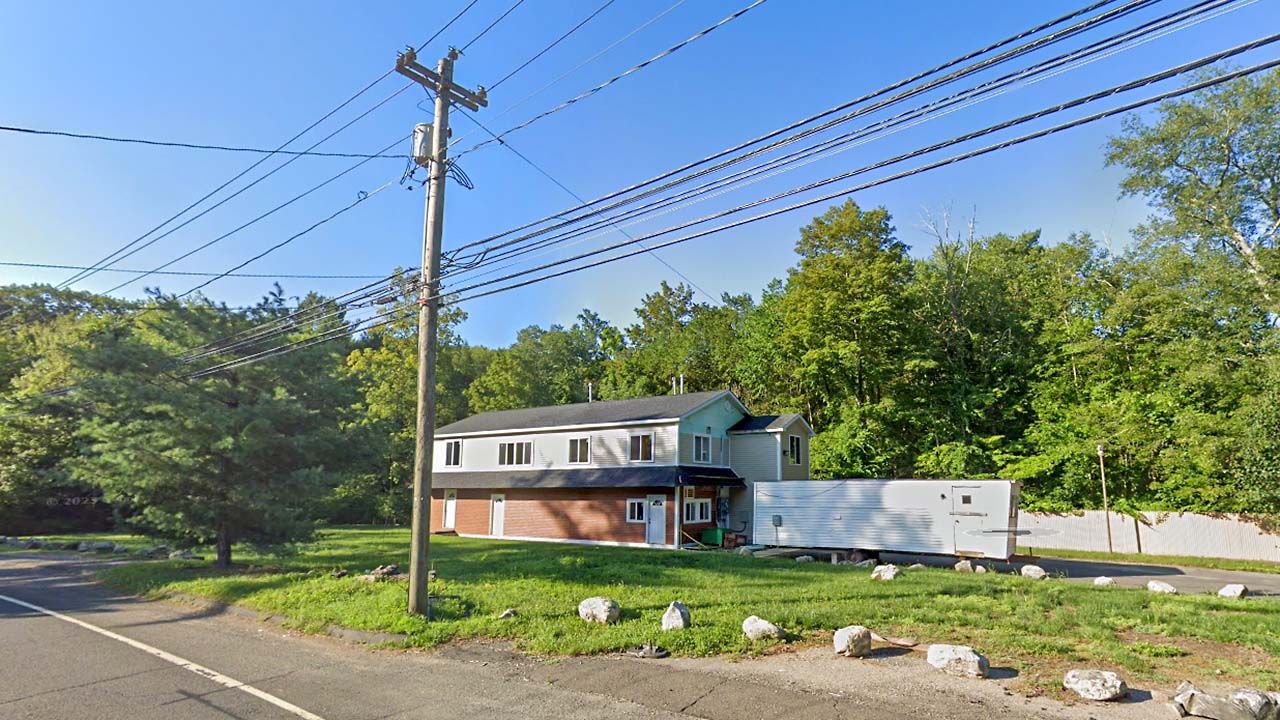Apartments Application to P&Z

107 Georgetown Road. Google image
At a Planning and Zoning Commission hearing on April 1, commissioners began consideration of a rare application to permit development of an apartment complex in Weston under the auspices of Connecticut Statute 8-30g.
The statute gives developers legal recourse if, because of local zoning regulations, an application to build affordable housing is denied. It places the burden on zoning authorities to prove that health, safety, or other considerations outweigh the need for affordable housing.
As complexes go, this one would be minimal. It would be done on a parcel just under one-half acre at 107 Georgetown Road, once the site of an automotive service station.
Property owner August Lenhart (as Weston I, LLC) proposes to build three one-bedroom apartments to go along with an existing apartment in the structure. Weston zoning regulations do not allow that, so Mr. Lenhart’s P&Z application invokes 8-30g, the Affordable Housing Land Use Appeals Act.
The act applies if less than 10 percent of the town’s total housing stock is affordable, as defined by metrics in the statute. Virtually none of Weston’s housing stock meets that definition. (Few Connecticut municipalities are over the 10 percent mark.)
One affordable one-bedroom
Mr. Lenhart proposes to qualify for the 8-30g workaround by designating only one of the proposed apartments as affordable. To legally have that designation, the unit would be deed restricted for 40 years. During that time, it could only be rented to those whose annual income is at least below 80 percent of the state or regional median, and its rent (plus utilities) could not exceed 30 percent of income.
But it is not clear that Mr. Lenhart’s proposal qualifies. Town Counsel Peter Gelderman said this is the “threshold question,” because if the answer is no, the commission cannot approve the application in any case.
To be valid under 8-30g, at least 30 percent of the units in a proposed development must meet the statutory affordability definition. One unit out of four comes up short, as commission chair Sally Korsh pointed out on Monday evening.
Mr. Lenhart responded that the commission should view the development as involving only the three new units, since one apartment has been there “for decades.” That would put his proposal over the 30 percent hurdle.
Ms. Korsh doubted that the commission could legally treat one structure as two separate developments, and asked for a citation of law or precedent for doing so. Mr. Lenhart’s attorney said he would research “analogous cases” before the hearing continues on May 6.
Other issues
When the hearing does resume, other questions must be resolved. Mr. Lenhart told the commission the existing apartment has two bedrooms, but his application says it has one. As proposed, two would make a total of five on the property, which Ms. Korsh noted would exceed the property’s septic permit. Mr. Lenhart said he recalls the permit allowing five bedrooms, but the facsimile appended to his application says four.
The commission will also have to consider concerns raised by residents on the abutting street, Samuelson Road. Several expressed worries about the safety of children boarding school buses at the intersection, since the driveway of 107 Georgetown Road is on Samuelson, which is narrow. Four households with as many as eight cars, they said, could pose a hazard.
Mr. Lenhart responded that a previous Town permit — which he said had been “yanked” without explanation — required the relocation of the driveway, so the objections were “too late.” He said he had originally intended to reopen the service station, but had been rebuffed by the Town.
Other neighbors wondered about the project’s impact on wetlands, given the presence of a nearby stream. A Conservation Commission permit included with Mr. Lenhart’s application found no adverse impact on wetlands, but that permit expired several years ago. And, since the property is in a flood plain, Planning & Zoning would have to issue a flood plain permit.
Attorney Gelderman reiterated that these issues are moot if the proposal is not a valid use of 8-30g in the first place.
